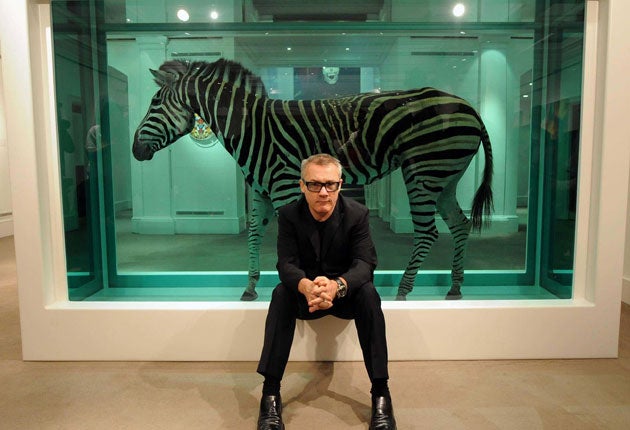Mr 10 per cent (and he's worth every penny)
Frank Dunphy has spent his career taking care of business for celebrities with more money than financial sense. And this week's Damien Hirst sale was his coup de grâce. By Cahal Milmo

As the hammer went down on works such as Damien Hirst's Golden Calf, a pickled bovine with 19-carat hooves that sold for £10.3m, in an electrified Sotheby's showroom, only a few of the gathered art cogno-scenti would have appreciated the importance of the ruddy-faced, rotund Irish accountant hovering in the background.
Were it not for Frank Dunphy, the affable septuagenarian Dubliner who has handled the tax returns and the business affairs of the world's richest living artist for the past 13 years, the £111m sale of Hirst's work on New Bond Street this week – setting a new record for an auction of the works of a single individual – would not have taken place.
It was Dunphy who first came up with the idea of the "straight-to-auction" sale, by-passing the traditional route of an art gallery and a hefty dealer's commission, two years ago. The accountant then persuaded his reluctant client of the merits of seeking to clear his stock of spot paintings, butterfly compositions and beasts from a zebra to a tiger shark preserved in formaldehyde, in a single orgy of seven-figure bids.
The unparalleled success of the Sotheby's event, which drew grumblings about conspicuous consumption at the height of a global economic crisis, underlined the status of Dunphy. After this week's auction Hirst is now worth an estimated £600m. And it was not a bad couple of nights' business for his accountant and business manager, whose commission of around 10 per cent on every work had made him about £11m richer by yesterday morning.
As Dunphy, who surveyed proceedings from the back of the saleroom while providing updates by phone to the artist (elsewhere playing snooker), put it after the second night of the two-day sale: "I woke up this morning in the teeth of the gale of recession. But we came out as confident as ever."
The ascent of Dunphy – a father-of-two with a garrulous manner and north Dublin accent which he takes pride in – to the role of Mr Hirst's impresario was merely the latest twist in a colourful life.
It began in the austere surroundings of post-war Ireland with a childhood sideline in delivering republican leaflets. After arriving in Britain in the 1950s with a strong education at the hands of the Christian Brothers, Dunphy took a job with an accountancy firm dealing with showbusiness acts. He found himself catering for Peaches Page, the nation's first touring nude dancer, Julie Mendez and Her Performing Python, and a host of famous names in subsequent years that included Coco the Clown, Roy Castle, Imelda Staunton and Led Zeppelin.
His relationship with Hirst began in 1995. There are two versions of how the pair got together. According to Dunphy, it happened when Hirst's mother cornered him in the Groucho Club, and, upon learning of his profession, introduced him to her son to sort out his finances.
Hirst says they had been vague acquaintances over the Groucho's snooker table but only got to know each other properly when the Inland Revenue sent a mysterious demand for £32,000 to Hirst's White Cube gallery and the wife of his drinking partner, the actor Keith Allen, suggested "Frank" as the man to sort it out.
Whichever is correct, there is agreement between the two that Hirst, at the time universally regarded as the enfant terrible of the Britart scene, "had a few VAT and tax problems" which Dunphy, now 70, successfully resolved.
Speaking last year about the influence of his commercial eminence grise, Hirst said: "Before he came along, I was like a punk, really. I didn't care about money. Or I pretended not to care. But when the figures start to get high, it's hard to pretend you don't care. It scares the shit out of you. He got me over the fear. I'd still be drinking and I'd probably would have found some way to fuck it all up if Frank hadn't come along."
For better or worse, money has been at the heart of the resulting relationship, with Dunphy telling the young Hirst: "An artwork is only worth what the next guy is going to pay for it."
Having put Hirst on the financial straight and narrow, Dunphy set about laying the groundwork for his dominance of the contemporary art market. The accountant renegotiated Hirst's gallery contracts, ensuring that the share of the proceeds from any sale increased from the standard of just 50 per cent to between 80 and 90 per cent.
Dunphy also assisted Hirst in his controversial expansion into production-line art – the 180 employees and five studios which produce much of the artist's oeuvre in the manner of a Renaissance master – and manages his assets, including up to 40 properties and an art collection worth at least £200m. The Irishman has been spotted in salerooms snapping up the odd Francis Bacon on behalf of his client.
It is a teacher-student, or even parent-child, relationship epitomised by Dunphy's talent for spotting lucrative opportunities.
One London-based dealer said: "Frank is everything you could want in a money guy. He's gregarious, smart and lightning quick. He also takes absolutely no shit from anybody when it comes to defending his client's interests."
Join our commenting forum
Join thought-provoking conversations, follow other Independent readers and see their replies
Comments
Bookmark popover
Removed from bookmarks